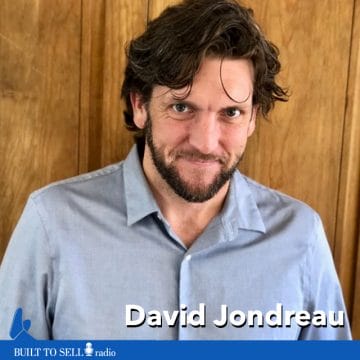About this episode
David Jondreau built American Sign Language, a company that supplied interpreters on contract, to $2 million in annual revenue when he decided it was time to sell.
A broker introduced Jondreau to New Language Capital, an investor doing a roll-up of language services companies. New Language agreed to buy American Sign Language for 3.5 times pre-tax profit or around $700,000. The two parties signed a Letter of Intent, and they were amid diligence when Jondreau won a massive new contract. That’s when Jondreau decided it was time to re-negotiate and managed to double his proceeds from his sale.
Jondreau shares some sage wisdom in this episode, including:
Document your processes: Jondreau took over American Sign Language when his father died suddenly. Most of the company’s procedures had been in his father’s head, so Jondreau started to piece together his systems for running the company. These processes enabled the business to run well without Jondreau — which was critical to the acquirer.
49/49/2: Jondreau inherited American Sign Language with his sister. Instead of splitting the business 50/50, the siblings decided to give 2% of the company to Jondreau’s mother, making it a majority women-owned business allowing them to bid for lucrative institutional contracts that often showed a preference for majority women-owned businesses.
Adjustments: Before going to market, Jondreau tidied up his P&L, removing any personal expenses, and having his books audited, which went a long way to increasing the confidence of New Language Capital.
There’s lots more to learn from Jondreau, including:
- The surprising reason he decided to sell in his 40’s.
- How to deal with accounts receivable when you hand over the keys to your business.
- A definition of a bridge loan and when you might need one.
- The candid truth about the psychology of selling a business.
- The difference between “F.U. Money” vs. “Thank You Money.”
Jondreau’s deal almost got derailed because of a negative cash flow cycle, which means the faster he grew, the more likely he would get squeezed for cash. The opposite is a positive cash flow cycle, which means you accumulate more money, the faster you grow. We’ll help you turn a negative cash flow cycle into a positive one in Module 10 of The Value Builder System™ — complete Module 1 free now by getting your Value Builder Score.

About Our Guest
When David Jondreau inherited American Sign Language, Inc. (ASLI) in 2004, he had no idea what he was doing. He was familiar with the company, a small service that provided onsite interpreting services for the Deaf. He had grown up in it after all but he lived in a desert cabin 2,000 miles from its NYC headquarters, was 28 years old, and had never run a business.
Fifteen years later, David had turned into an entrepreneur. He and his sister, Jennifer, had learned on the job, increasing revenue seven-fold and getting the exit they wanted. Now, he spends his time designing software and consulting on how to manage the practical and emotional ups and downs of business ownership.
He can be reached on LinkedIn https://www.linkedin.com/in/david-jondreau/ or by email [email protected]


